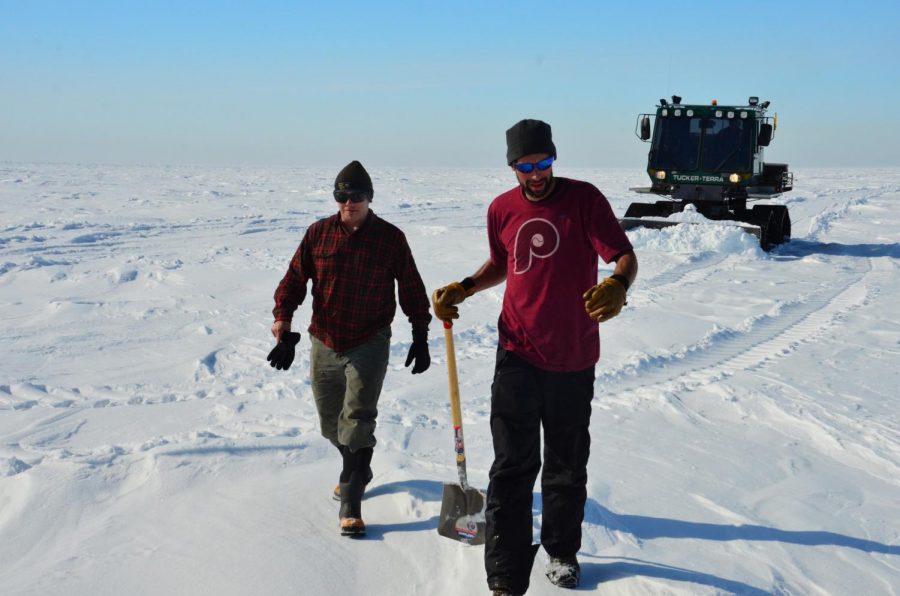Loyola professors speak up about science change
Loyola science professor Philip Bucolo conducts research in Antartica at Palmer Station. Bucolo’s studies include aquatic community ecology. Courtesy of Philip Bucolo.
February 7, 2020
When biology professor Paul Barnes was appointed to the United Nations Environment Programme Environmental Effects Assessment Panel in 2014 and was tasked with informing officials about scientific research for the sake of the Montreal Protocol, an international environmental treaty, he was hit with a startling reality. The phrase “climate change,” would not be allowed in the titles of any of the panel’s reports.
“‘(Climate change)’ was too politically sensitive to some countries,” Barnes said. “We could write about it in our report, but we couldn’t include it in our title.”
The political sensitivity of the term, however, doesn’t equate to the destruction climate change itself has made a reality, according to Vairleene Einstein, an environmental studies sophomore at Loyola.
Einstein, a member of Loyola University’s student organization, Students for Environmental Action, said this issue was worsened by a lack of communication between sciences and the public.
“The lack of science information is what leads to a lot of ignorance at the end of the day because they really don’t know the severity of their actions,” Einstein said.
Scientific communication, however, doesn’t primarily consist of communicating solely about what climate change is, according to Visiting Assistant Professor of Biology and Environmental Studies Phil Bucolo.
“I can tell you all day what the issues are on a thousand different avenues of evidence- from million-year old-glaciers receding at exponential rates to a lack of sea ice every year in the poles to the fact of Australia,” Bucolo said. “There’s so much evidence out there, but if you don’t want to believe it, there’s someone else that will be on your side. And as long as there is power in numbers, it doesn’t matter what the scientists and engineers tell them.”
About one-third of the U.S. population is in the number of those that deny climate change, according to Barnes, and the Trump administration neglected to attend the climate change meeting at the G7 Summit in 2019.
Barnes said he feels like attempts to change the minds of those that deny climate change are futile. However, he thinks there is a group in society that could be swayed if climate change was presented to them in a way that could be easily understood and digested.
“Farmers for example, they know the weather is changing, and they know it’s affecting their crops and their livelihood, and they want to know what to do, and so, there might be someone they would listen to,” Barnes said. “I’m not sure they would listen to a scientist. From what I’ve learned, people take information differently based on who they trust and who they know.”
Barnes said widespread opposition to climate change isn’t due to the fact that the information isn’t out there. Instead, he thinks it’s a problem of communication. He sees the need for people to be informed not just about the facts but what they can do in their own lives.
While many of Barnes’ colleagues agreed that solutions should be communicated, many at Loyola struggle to balance such values with the everyday worries of a scientist.
Bucolo, a Loyola alumnus, whose educational background covers the study of aquatic community ecology, said that as a scientist, the focus of communicating with the public is difficult to prioritize while worrying about one grant after another.
“I joke to students that the scientists illustrate what the problems are and then the engineers go and fix them, but at some point we have to say ‘I found this, and this is important because of this and if we don’t do something it’s going to lead to this, and we should do this to fix it,'” Bucolo said.
An approach to solving the monumental issue of climate change has to begin with an appeal to consumerism, according to Bucolo.
Bucolo, who has spoken to his father and people of his generation for over 10 years and finally convinced them of climate change and its effects, says despite the change in mindset, they are hung up on the economic implications of the issue.
“Their argument now is ‘How are we going to fund ourselves if you are hurting our economy so much by these regulations?'” Bucolo said. “That’s really what they’re hanging their head on like ‘We should not be worried about this if China and India are not worried about this,’ and that’s a capitalism thing. That’s not an ecology thing.”
Barnes said what is really needed is to start connecting the dots.
“One topic of key interest right now is immigration and migrants,” Barnes said. “Write about why they’re moving, where they’re from and how they’re trying to go other places. Climate change is a big factor in that.”
Barnes’ biggest concern, however, is that with disregarding science, comes a lost respect for facts.
“You just can’t be an expert overnight,” Barnes said. “There are experts, and there are people of knowledge that you should rely on for making decisions if you want to take a reasoned approach to solving things. Science has to play a role in that.”
Barnes added that this issue is made worse by politicians and companies that exploit people’s fears of scientific facts to further perpetuate a distrust of scientific research.
The fear behind the topic of climate change, however, isn’t one sided.
“I’m horrified that the connotation of the journalist can drive a narrative regardless of evidence,” Bucolo said.
Barnes seconds Bucolo’s sentiments.
“If there’s 99 out of 100 scientists that say this is what’s causing climate change, you can’t have one on each side in your article,” Barnes said. “That completely distorts the reality. It says they’re balanced views, and they aren’t. It completely destroys that argument.”









Alum '07 • Feb 10, 2020 at 10:00 am
Correct, we should use knowledge and science including economics. Note this quote below is not the problem:
“Bucolo said. “That’s really what they’re hanging their head on like ‘We should not be worried about this if China and India are not worried about this,’ and that’s a capitalism thing. That’s not an ecology thing.””
It’s an issue of game theory and economics. Why should I hurt my economy to try and save the environment if China and India are going to pollute to the max and how do you get everyone to co-operate without other parties cheating on the deal? (i.e. China who doesn’t even respect copyright laws or basic human rights). We can be the greenest country in the world but if someone like China continues to pollute, we’re still all going to hell in a hand basket.
Part of the problem with the environmental movement right now is that we have scientific observations of the problem. When it comes to proposed solutions, we enter fantasyland and ignore everything that we know about economics, game theory, etc…